On October 30, the launch event on The 2022 Report of the Lancet Countdown on Health and Climate Change was held in Beijing. Professor Rong Zeng, Vice-President of Tsinghua University, Prof. Peng Gong, Co-chair of Lancet Countdown, Vice-President and Pro-Vice-Chancellor of the University of Hong KongPeng Gong, Professor Yong Luo, Chair of the Department of Earth System Science in Tsinghua University, Dr. Helena Wang, Asia Executive Editor of The Lancett, and Dr. Marina Romanello, Executive Director of Lancet Countdown delivered online speeches. Professor Chi Zhang of the Beijing Institute of Technology, Assistant Researcher Shihui Zhang and Associate Professor Wenjia Cai of the Department of Earth System Science (DESS), Tsinghua University interpreted the report. The event was presided over by Prof. Yong Luo, Vice Dean of the School of Science, Chair of the Department of Earth System Science, Tsinghua University.
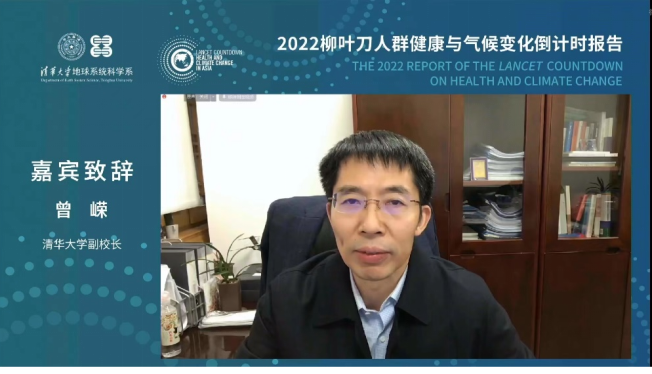
Rong Zeng delivers an online speech
Rong Zeng noted in his speech that the DESS, Tsinghua University led several top institutions at home and abroad to compile and launch The 2022 Report of the Lancet Countdown on Health and Climate Change in an effort to cope with the major challenges of climate change to people’s health, disclose the impact of climate change on health, and seek solutions to collaboratively address climate and health problems. This is not only an effort to implement the important instructions stressed by President Xi Jinping at the 20th CPC National Congress, that is, “to advance the Healthy China Initiative, and give strategic priority to ensuring the people’s health”, “to advance the Beautiful China Initiative”, and “respond to climate change”.
Rong Zeng noted that since 2020 the annual China Lancet Countdown Report has been continuously tracking the impact of climate change and actions in response to climate change on the health of the Chinese people, and promoting substantial progress in a number of national strategies and policies related to climate change. This year's report launch event has expanded our vision from China to the rest of Asia, demonstrating Tsinghua people’s responsibility for and commitment to promote the building of a community with a shared future for mankind and boost the health and well-being of all mankind.
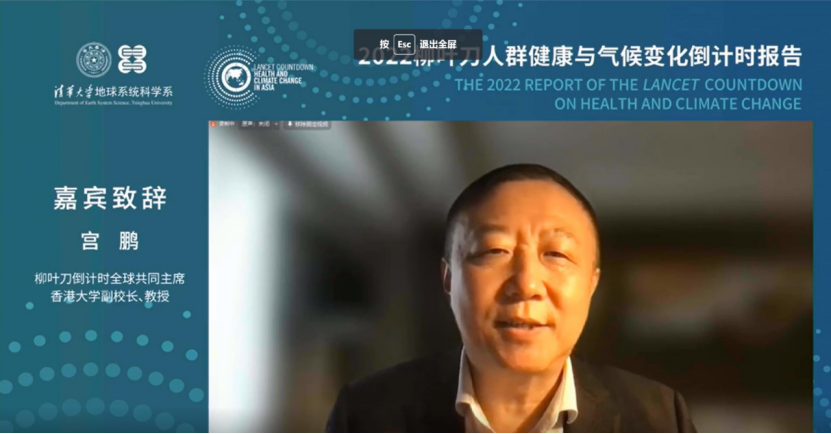
Peng Gong delivers an online speech
Peng Gong reviewed the collaboration between Tsinghua University and The Lancet over the past decade. He noted that the international cooperation model of The Report of the Lancet Countdown on Health and Climate Change has not only fostered the academic growth of many young scholars, but also promoted the development of relevant disciplines in the region.
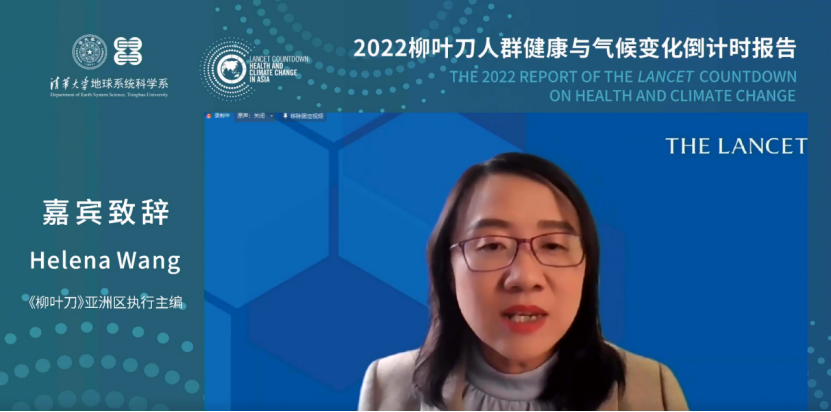
Helena Wang delivers an online speech
Helena Wang in her speech recognized the academic achievements scored by the DESS, Tsinghua University and the Lancet Countdown Asia Center, and extended her appreciation for the good communication effect worldwide achieved via the Lancet platform. Wang noted that The Lancet has always been valuing close cooperation with Chinese scholars, and wishes to continue to work with Chinese scientists in the future for the global health cause, including that in China.
Marina Romanello pointed out that the world is facing multiple compound crises, challenges exacerbated by climate change. She suggested that to protect people’s health, fossil fuel use must be reduced and action taken to cope with climate change.
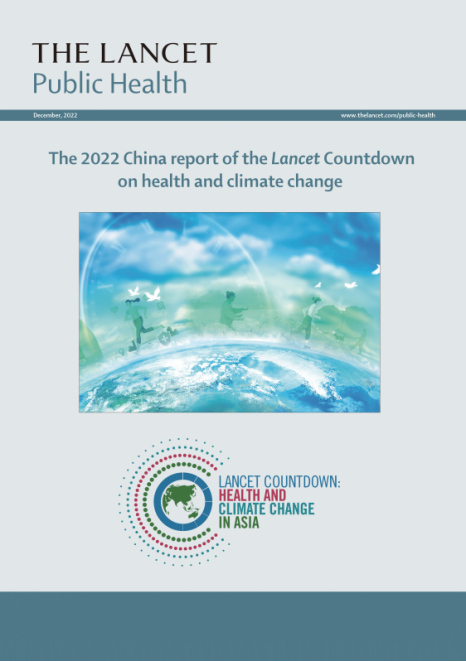
From last year's Baiyin Marathon Incident in Gansu Province and 7.20 Rainstorm in Zhengzhou, Henan Province, to this year's extreme high temperatures and droughts, climate change and extreme climatic events have been undoubtedly impacting people's health. In addition, no country can be immune to the health hazards of climate change, and dealing with the climate crisis is a matter of concern to each and every one of us.
Two major reports were released in this year’s launch event, The 2022 Global Report of the Lancet Countdown on Health and Climate Change (hereinafter referred to as the "Global Report") and The 2022 China Report of the Lancet Countdown on Health and Climate Change (hereinafter referred to as the "China Report"), with a view to keeping track of the global climate change trend, thoroughly discussing the current climate and health problems in Asia and China, and providing policy suggestions for realizing the dual goals of climate and health as soon as possible. The composition of the China Report has been spearheaded by The Lancet Countdown Asia Center based in the DESS, Tsinghua University and completed by 73 experts from 23 major institutions at home and abroad.
Considering that Asia is the region with the highest population density in the world and most seriously subject to the impact of climate change, Assistant Researcher Zhang Shihui of the DESS, Tsinghua University, in this event, introduced the inspiration of the core conclusion of the Global Report to Asia. The report alerts the public to the rapidly growing climate health hazards in China and neighboring Asian countries. With regard to climate-sensitive infectious diseases, for example, compared with the historical benchmark (1950-1964), the climatic suitability of Dengue transmission has grown significantly in Asian countries, with 15 Asian countries among the top 20 countries in the world in terms of the growth rate. The report proposes that the transition to clean energy can not only directly diminish climate risks, but also improve people's health by improving air quality and reducing the risk of zoonotic diseases. The promotion of electric vehicles in China is a major effective practice. From 2019 to 2020, the global sales of electric vehicles more than doubled, and the sales of electric vehicles in China accounted for 12% of the global total.
Different from the first China Report of the Lancet Countdown in 2020, this year's China Report has not only improved many evaluation indicators, but also taken into consideration the upsurging of outdoor activities and the health problems of vulnerable populations by adding two new indicators, namely heat and sports and the exposure of populations to sea-level rise (SLR).
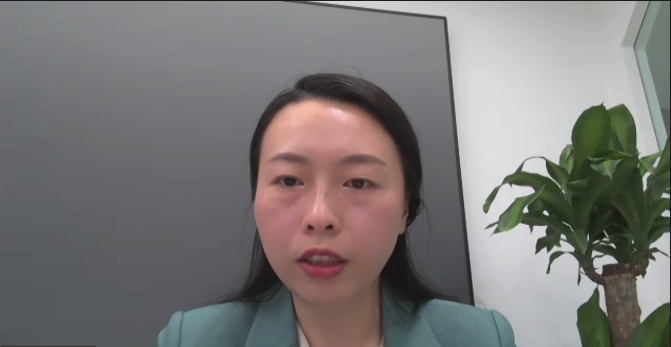
Wenjia Cai delivers an online report
Urgent: Climate change continues to threaten the health of Chinese residents
Wenjia Cai, while introducing the China Report, noted that China, as a region sensitive and vulnerable to global climate change, is witnessing the rapidly rising threat of climate change, especially its threat to public health. According to the report, compared with the average of 1986-2005, Chinese people experienced an average of 7.85 more heat wave days in 2021, while the time for safe outdoor activities was shortened by 48.2%; the potential labor time decreased by 7.1%, while the wildfire exposure increased by 62.7%; and compared with the historical baseline period, Chinese residents’ health was increasingly affected by extreme rainfall and dengue fever over the past decade.
Imperative: more attention should be paid to the health of the elderly
Under extreme high temperature conditions, different age groups are affected by the environment to different extents. The thermoregulation ability of the elderly (especially those over 65 years old) is declining as they grow older, and the adverse effects ensuing this decline are particularly salient when the elderly are exposed to continuous high temperature weather. The report points out that people over 65 years old are more vulnerable to the health hazards of climate change than others. In 2021, 76.0% of heat-related deaths occurred to elderly people aged 65 and above. In 2020, the elderly accounted for 13.5% of the total population of China, which proportion is estimated to increase to 26.1% by 2050, exceeding the current proportion of most developed countries. The report proposes that effective measures be taken to better protect the elderly’s health and safety in view of their vulnerability to climate change.
Long way to go: actions have started but should be strengthened
Over the past two years, the issue of climate change and health has drawn close attention from government departments. In 2022, the National Climate Change Adaptation Strategy 2035 was released, and thus for the first time "reducing the health hazards of climate change" was included as a work focus in the "Healthy China" Initiative. These developments respond to the policy recommendations proposed in The China Report of the Lancet Countdown published in 2021. Meanwhile, this year's report shows that from 2020 to 2021 the reports on climate and health by Chinese scholars and government websites increased by 14.2% and 2.8 times respectively. In response to the COVID-19 pandemic, most provinces in China have also improved their capabilities to monitor, prepare for and respond to public health emergencies.
Win-win outcome: proactive response to climate change benefits people's health and boosts green sustainable development.
Proactive actions in response to and mitigating climate change can not only reduce future climate risks and protect people from the health threats of climate change, but also promote high-quality social and economic development, leading to green recovery. The report puts forward the following five suggestions: 1. Strengthen the attention of government departments to adaptation issues and speed up investment in climate resilience; 2. Formulate special national climate adaptation plans for health; 3. Prioritize consideration about climate change in health policies, with special attention to vulnerable populations; 4. Accelerate the pace of coal phase-out, and incorporate health factors into the path design of carbon neutrality in China; 5. Promote low-carbon economy through market mechanism and encourage electricity generation and consumption from more renewable energies, in efforts to strengthen China's leading role in the global low-carbon industry and energy security.
At the launch event, Tiantian Li, Director of the Environmental Health Hazard Assessment Office, Institute of Environment, Chinese Center for Disease Control and Prevention; Min Liu, Member of the Hubei Expert Committee on Climate Change; Melisma Tabatabaei, Professor of Environmental Biotechnology, Universiti Malaysia Terengganu, Chong Yu, Chief Representative of WildAid Beijing Office, Rui Zhang, Professor of the Department of PE, Peking University and Secretary General of the Chinese Adventure Association and other participants discussed such matters as extreme weather and climate events and health of public outdoor sports and answered questions from the audience.
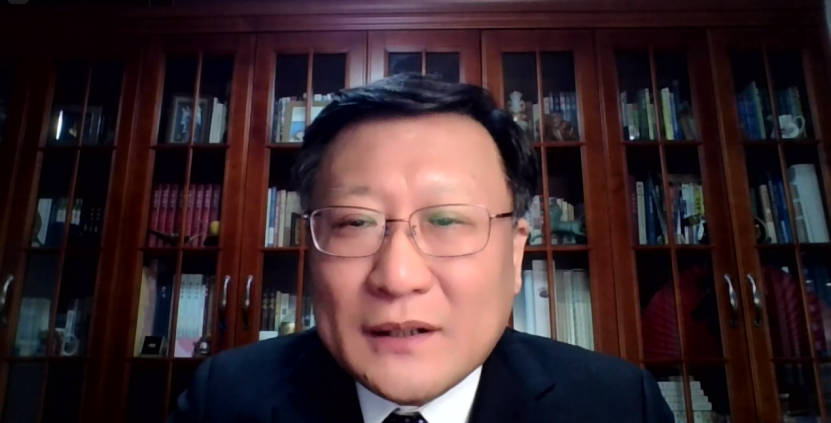
Luo Yong delivers a concluding remark
In his concluding remark, Yong Luo extended warm congratulations and sincere thanks to the author team of The 2022 Report of the Lancet Countdown on Health and Climate Change, hoping that the launch of the report can promote dialogues and exchanges among academia, policy makers and the public, enhance the action of the whole society in response to the health hazards of climate change, and contribute wisdom to addressing major issues of climate change adaptation and sustainable development in China and the whole world. At the same time, he also thanked the multimedia platform for the extensive attention drawn to the report, and hoped that the report and its launch event would become a scientific communication brand comprehensively outlining the correlation between climate change and people's health in China. Let's work together and take climate actions today for the healthy ageing of ourselves and our children and grandchildren, and create a win-win future for climate change response and human health.